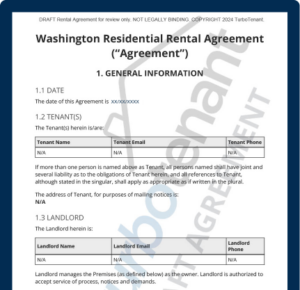Whether you live in Seattle or Spokane, Washington landlord-tenant law varies significantly from other parts of the country. As a result, both landlords and tenants must understand the details of Washington tenant rights, security deposit laws, and more.
This guide from TurboTenant will help you understand the details of Washington’s rental regulations, including tenant screening practices and the eviction process. Keep reading to learn what you need to know about landlord-tenant laws in the Evergreen State.
Marketing. Applications. Leases. Payments.
Key Findings: Landlord-Tenant Rights & Responsibilities
Landlords and tenants in Washington are guaranteed certain rights in exchange for fulfilling basic responsibilities in the rental relationship. We’ll cover some of the most important aspects below:
Washington landlords have the right to:
- Charge an application fee for tenant screening
- Charge a security deposit to cover late rent and damages
- Charge rent and late fees for overdue rent
- Enter the dwelling unit if necessary
- Evict tenants if necessary
Washington landlords are responsible for:
- Providing safe, habitable housing to all tenants
- Completing necessary repairs in a timely manner
- Giving notice before entering the dwelling unit
- Returning the security deposit and providing a statement of deductions at the end of a tenancy
- Adhering to the terms of the lease
Washington tenants have the right to:
- Access safe, habitable housing
- A 5-day grace period for late rent
- Conduct repairs and deduct from rent
- Receive notice before the landlord enters the dwelling unit
- Receive their security deposit after moving out
Washington tenants are responsible for:
- Maintaining dwelling unit in clean, sanitary condition
- Paying rent and utilities if required
- Not engaging in or permitting illegal activity in the dwelling unit
- Properly operating all provided appliances
- Adhering to the terms of the lease
Best Practices for Screening Prospective Tenants
Before entering a rental agreement, landlords should screen all tenants for red flags like previous evictions or poor credit history. To pay for this screening, Washington landlords can charge a rental application fee equal to the actual screening costs (RCW 59.18.257).
As part of the screening process, landlords may run a criminal background check and a credit check, though they must screen all applicants equally. Under the Fair Credit Reporting Act (15 USC § 1681), landlords must also notify tenants if a low credit score leads to a denial of housing.
For a hassle-free tenant screening experience, check out TurboTenant’s Tenant Screening features.
Compliance with Fair Housing Laws in Washington
Washington utilizes both federal and state fair housing laws. These regulations help renters seek safe, habitable housing regardless of factors such as race, gender, and religion.
What actions are considered housing discrimination?
Landlords may not harass, refuse to rent, or misrepresent rental availability to protected class members. Landlords must also advertise to and screen all potential tenants equally, regardless of extraneous circumstances like an applicant’s marital status or sexual orientation (RCW 49.60.222).
How can discrimination be avoided in rental practices?
Landlords must apply all advertising, screening, and rental rules equally to tenants. They must also be willing to permit reasonable modifications allowing individuals with disabilities to rent the property (RCW 49.60.222). Finally, landlords must train all staff to avoid housing discrimination, as landlords can be held liable for employee violations.
What are the repercussions for fair housing violations?
Landlords who violate fair housing laws may face legal penalties and have to pay tenant damages, as well as fines of up to $50,000 (RCW 49.60.225).
If accused of a fair housing violation, landlords should document all evidence to the contrary and promptly seek civil legal assistance.
Washington Lease Agreements
According to the Tenants Union of Washington State, Washington landlord-tenant law does not require written rental contracts for month-to-month leases, which typically expire and renew at the end of each month until terminated by either party.
On the other hand, fixed-term leases of a year or more require a legally binding, written Washington lease agreement. No matter the lease duration, a written contract will help clarify the lease terms and prevent future disputes.
Which lease terms are legally required in Washington?
Washington state does not require landlords to include specific terms in the lease. However, landlords generally provide the duration of the rental agreement, information regarding rent payment, and the names and contact information of the involved parties.
What constitutes legal renting in Washington?
Leases in Washington may not contain unconscionable terms, such as terms that waive the tenant’s rights (RCW 59.18.230). Additionally, Washington tenant rights require landlords to provide safe, habitable housing and make all mandatory disclosures.
A relatively new Washington landlord-tenant law, RCW 35A.21.314, prohibits landlords from enforcing occupancy limits in dwelling units.
What tenant documentation is required?
Most landlords require tenants to provide certain documents, such as a valid ID, proof of income, and signed consent for a credit check, to apply to rent a dwelling unit. Both landlords and tenants should record all rental transactions to guarantee their legal standing in the case of future conflict.
What are the mandatory landlord disclosures in Washington?
Under Washington tenant rights, landlords must disclose the presence of lead-based paint (Title X, Section 1018), their name and address or that of any agents, the security deposit bank name and location, a notice of fire safety information, and a notice of the hazards associated with mold (RCW § 59.18.060). Tacoma residents have some added disclosures: number of allowed occupants disclosure and uninhabitable spaces disclosure (TMC 1.95, RHC.
Landlords who fail to make these disclosures may face lawsuits resulting in the need to pay fines or tenants’ damages.
Security Deposits in Washington
Landlords may charge tenants a security deposit to cover unpaid rent or damages that exceed normal wear and tear. As such, security deposits are crucial to the rental process. They allow landlords to protect themselves and their properties.
What are the guidelines for security deposit collection?
Washington landlord-tenant law does not limit the amount landlords can charge for security deposits. However, landlords must provide tenants with a receipt for the security deposit, including the name and location of the financial institution holding the funds (RCW 59.18.270).
To collect a security deposit, landlords must first provide a walk-through checklist — signed by both the landlord and tenant — detailing the property’s condition at the time of move-in (RCW 59.18.260).
When can deductions be made from security deposits?
Landlords may remove funds from security deposits to cover unpaid rent or property damages exceeding normal wear and tear. Washington tenant rights in 2024 also require landlords to prepare an itemized statement explaining any deductions made from the deposit (RCW 59.18.280).
How should security deposits be returned?
Within 30 days of the tenant’s move-out, landlords must return unused portions of the security deposit and an itemized statement with information on any deductions made (RCW 59.18.280). To avoid arguments with tenants, landlords should communicate any charges against the deposit as they occur.
Maintenance Responsibilities of Landlords
Washington landlord-tenant law requires landlords to provide safe, habitable housing in accordance with all housing regulations. This includes performing any maintenance necessary to keep the dwelling unit in good condition.
What are the legal standards for property conditions?
Landlords in Washington must ensure that their rental units meet all safety and health standards, including building codes. Dwelling units must be structurally sound, and any landlord-provided amenities must be maintained in working order (RCW 59.18.060).
What is the proper protocol for repairs?
Tenants must first file a repair request with the landlord. If the landlord does not respond or complete the repair within a reasonable time frame, the tenant must then send a good-faith estimate to the landlord. If the repair remains incomplete after 10 days, the tenant may contract a professional and subtract the repair cost from rent payments (RCW 59.18.100).
Do landlords need to give tenants advance notice before accessing a rental property?
Landlords must provide at least 2 days’ written notice before accessing the rental property and may only enter at reasonable times. No notice is required in an emergency (RCW 59.18.150).
If the landlord repeatedly fails to notify tenants before entering the dwelling unit, the tenants may terminate the lease early and pursue legal action.
Late Rent Fee Regulations
Washington tenant rights provide tenants a 5-day grace period to pay rent (RCW 59.18.170). After this time, landlords may charge a late fee of $20 or 20% of the monthly rent (RCW 19.150.150). Seattle and Tacoma landlords can charge a late fee not to exceed $10.00. (TMC 1.100, LFC, and Seattle Ord. 126803).
Rent Control in Washington
As of 2024, Washington landlord-tenant law prohibits rent control, so landlords may charge rent in any amount deemed fit (RCW 35.21.830). However, landlords may only raise rent at the end of every lease term and must give written notice at least three months in advance (RCW 59.20.090).
Lease Renewal and Termination
Washington law requires automatic lease renewals in most cases (RCW 59.20.090). If landlords do not wish to renew a lease agreement, they must have good reason and notify tenants at least 60 days before the lease expires. Tenants, meanwhile, must notify landlords a month in advance if they do not intend to renew the lease (RCW 59.20.090).
Tenants may terminate a lease early or “break” the lease in certain circumstances, including if the tenant is a victim of domestic violence (RCW 59.18.575), if the landlord harasses the tenant (RCW 59.18.150), or if the tenant must depart for active-duty military service (50 U.S.C. App. §§501-597b).
Landlords may also terminate a lease early in specific cases, like intending to sell or move into the dwelling unit.
Eviction Procedures for Washington Landlords
As the eviction process varies across the country, Washington landlords must thoroughly understand all details regarding tenant removal in the Evergreen State. We’ll touch on some of the key points here.
What justifications exist for eviction?
Landlords may evict tenants for non-payment of rent, violating lease terms, or conducting illegal activity on the property. Before initiating the eviction process, landlords should thoroughly document all issues leading to the eviction, should the need to present them in court arise.
What is the eviction process?
To evict a tenant, landlords must take the following steps:
- Serve notice between 3 (illegal activity) and 14 (unpaid rent) days in advance (RCW 59.12.030)
- File an eviction lawsuit in Washington Superior Court (RCW 59.12.050)
- The court serves the tenant with a summons (RCW 59.12.080)
- Tenant files an answer within 20 days (WA Rules of Superior Courts, Civil Rules, Rule 4(b))
- The landlord and tenant both attend court the hearing to present evidence and receive judgment
- Tenant must move out within 3 (RCW 59.12.100) to 5 days (RCW 59.12.170)
- Sheriff forcibly removes tenant (if necessary) (RCW 59.12.170)
How is property reclaimed after eviction?
After the tenant has been removed from the property, the landlord may take steps to secure the property against the tenant’s return. However, if the tenant left behind belongings at the time of their departure, landlords must store the abandoned property and notify the tenant 30 days before disposing of or selling the items.
If the tenant wishes to reclaim the property, they must first pay the landlord storage costs (RCW 59.18.312).
Local Ordinances for Landlords and Tenants
Though Washington landlord-tenant law governs all rental relationships in the state, certain cities and counties, such as Seattle and Tacoma, may have further regulations.
Both landlords and tenants should brush up on these local laws via sites like Municode.
Federal Landlord-Tenant Laws
In addition to state and local regulations, federal laws such as the Fair Housing Act, the Americans with Disabilities Act, and the Fair Credit Reporting Act all affect Washington rental situations.
You can research these laws and more at the Consumer Financial Protection Bureau, the Environmental Protection Agency, and other federal government websites.
Managing Tenant Legal Disputes as a Washington Landlord
While landlords may resolve disputes with tenants directly, further civil legal assistance may be needed at other times. Reach out to these resources for help:
- Washington Law Help: Nonprofit providing guide to civil legal services
- CLEAR Hotline: Toll-free Washington tenant rights hotline for low-income individuals
- Rental Housing Association of WA: Advocates for Washington rental housing providers
General Washington State Landlord-Tenant Law Resources
- Washington Residential Landlord-Tenant Act- Chapter 59.18 RCW
- Washington Landlord and Tenant Law- Title 59 RCW
- Manufactured/Mobile Home Landlord-Tenant Act – Chapter 59.20 RCW
- Washington Tenancies Law – Chapter 59.04 RCW
- Responsibilities of the Landlord Law- RCW 59.18.060
- Responsibilities of the Tenant Law – RCW 59.18.130
Fair Housing Resources for Washington State
Other Washington State Resources
- Washington State Security Deposit Law – RCW 59.18.280
- Washington State Late fees Law – RCW 19.150.150
- Residential Landlord-Tenant Resources – Office of Attorney General
Washington State City-Specific Housing Resources
Seattle
- Seattle Laws on Property Owner and Tenant Rights and Responsibilities
- Renting in Seattle – City of Seattle
- Fair Housing Information for Tenants/Renters – King County
Tacoma
- Landlord-Tenant Program – City of Tacoma
- Fair Housing Resources – Pierce County
- Tacoma-Pierce County Association of REALTORS®
Bellevue
Spokane Valley
Navigate Your Landlord-Tenant Relationship with TurboTenant
Beyond these legal resources, you can also utilize TurboTenant’s free property management software to navigate Washington landlord-tenant laws. Our user-friendly features include:
- Rental applications to quickly fill vacancies and avoid discrimination
- Thorough, compliant tenant screening reports
- Easily customized and legally reviewed lease agreement templates
- Rent collection software to track payments for easy record-keeping
Sign up for a free TurboTenant account and give yourself a leg up on complying with Washington landlord-tenant law.
Disclaimer: TurboTenant does not provide legal advice. This information is for educational purposes only. Always consult with a legal professional for personalized advice.
FAQs: Landlord-Tenant Laws in Washington
What are landlords required to provide by law?
Landlords in Washington must provide safe, habitable housing per all health and safety standards and abide by the lease terms. Tenants may expect additional amenities based on local market standards.
What is the proper notice period for lease termination?
The required notice period varies between three and 60 days, depending on the circumstances leading to the lease termination. The type of tenancy — month-to-month or fixed-term — may also affect the notice period.
How should utilities be handled in rental agreements?
Landlords or tenants may be responsible for paying utilities, but the lease must clearly outline this responsibility. Otherwise, disputes may arise, requiring legal intervention.
What maintenance rights do tenants have?
In Washington, tenants have the right to request repairs from the landlord. If the landlord doesn’t complete the repairs, tenants may conduct the repair and subtract the cost from rent or terminate the lease early.
What are the eviction rules for tenants without a lease?
Washington tenant rights still apply to tenants with no lease. This means landlords must serve a notice to quit and follow the correct eviction procedures.
How are guests and tenants legally differentiated?
Guests do not have to abide by a lease or pay rent, while tenants must adhere to the lease terms and pay rent. Doing so grants tenant rights.
Washington has no laws that stipulate when a guest may become a tenant. So, landlords must decide how long a guest may be permitted to stay before becoming a tenant.





